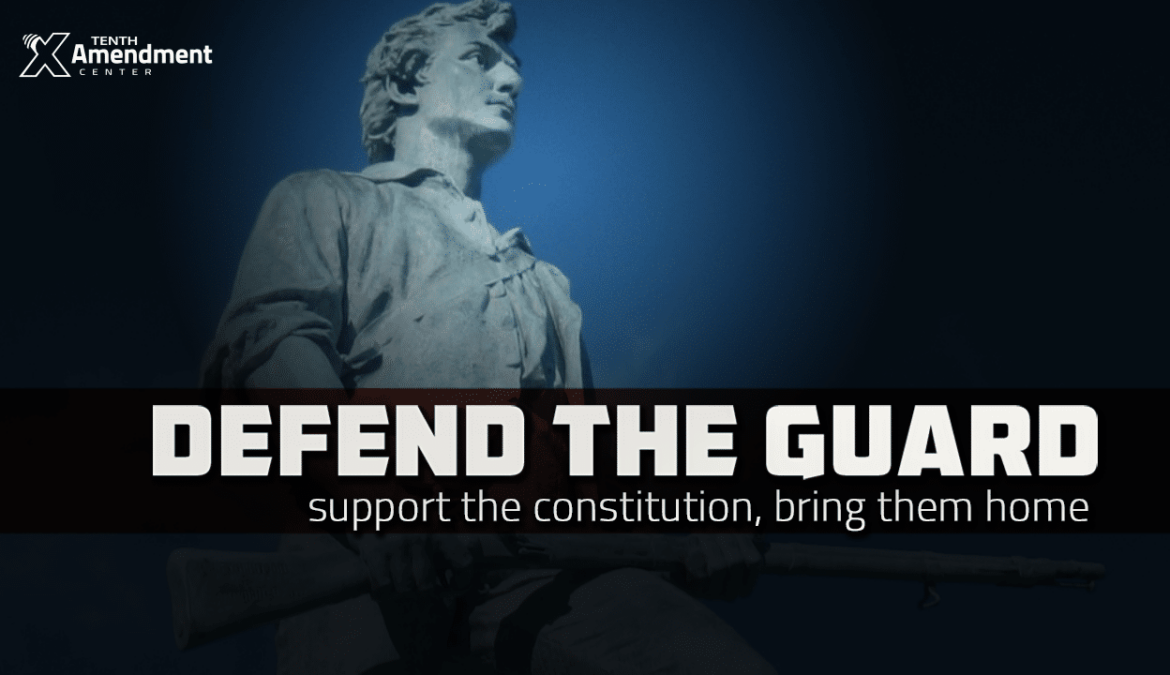COLUMBIA, S.C. (Dec. 22, 2020) – A bill prefiled in the South Carolina House would prohibit unconstitutional foreign deployments of the state’s National Guard troops. Passage into law would take a step toward restoring the founders’ constitutional framework for a state-federal balance regarding the state militia.
Rep. Stewart Jones (R-Laurens) filed House Bill 3528 (H3528) on Dec. 16. The legislation would prohibit placing South Carolina National Guard troops under federal control unless the governor determines they are being deployed in a manner consistent with the U.S. Constitution. The proposed law would require the governor to “examine, consider, and review” every federal order, including all existing orders, that call, transfer, or place the South Carolina National Guard on federal active duty.
Notwithstanding another provision of law, upon completion of the legal review required pursuant to this article, the Governor immediately shall withhold, withdraw, or revoke, or cause to be withheld, withdrawn, or revoked all state approvals, authorizations, or orders relating to the call, transfer, or placement of the South Carolina National Guard, or any of its subordinate commands, units, or personnel on federal active duty or under federal control in the absence of:
(1) a military invasion of the United States;
(2) an insurrection; or
(3) a calling forth of the South Carolina National Guard by the federal government in a manner provided for by the U.S. Congress to execute the laws of the United States, provided that these laws were made pursuant to powers delegated to the United States by the U.S. Constitution.
IN PRACTICE
National Guard troops have played significant roles in all modern overseas conflicts, with over 650,000 deployed since 2001. Military.com reports that “Guard and Reserve units made up about 45 percent of the total force sent to Iraq and Afghanistan, and received about 18.4 percent of the casualties.” More specifically, South Carolina National Guard troops have participated in missions in Iraq, Afghanistan, Syria, Kuwait, Kosovo and elsewhere.
Since none of these missions fall under the three criteria constitutionally necessary to call up the militia, the South Carolina Defend the Guard Act would have prohibited those deployments.
BACKGROUND
Article I, Section 8, Clauses 15 and 16 make up the “militia clauses” of the Constitution. Clause 16 authorizes Congress to “provide for organizing, arming, and disciplining, the Militia.” Through the Dick Act of 1903, Congress organized the militia into today’s National Guard, limiting the part of the militia that could be called into federal service rather than the “entire body of people,” which makes up the totality of the “militia.” Thus, today’s National Guard is governed by the “militia clauses” of the Constitution, and this view is confirmed by the National Guard itself.
Clause 15 delegates to the Congress the power to provide for “calling forth the militia” in three situations only: 1) to execute the laws of the union, 2) to suppress insurrections, and 3) to repel invasions.
During state ratifying conventions, proponents of the Constitution, including James Madison and Edmund Randolph, repeatedly assured the people that this power to call forth the militia into federal service would be limited to those very specific situations, and not for general purposes, like helping victims of a disease outbreak or engaging in “kinetic military actions.”
RETURNING TO THE CONSTITUTION
The founding generation was careful to ensure the president wouldn’t have the power to drag the United States into endless wars. James Madison made this clear in a letter to Thomas Jefferson.
The constitution supposes, what the History of all Governments demonstrates, that the Executive is the branch of power most interested in war, & most prone to it. It has accordingly with studied care, vested the question of war in the Legislature.
Congress has abrogated its responsibility and allowed the president to exercise almost complete discretion when it comes to war. Passage of Defend the Guard legislation would pressure Congress to do its constitutional duty.
West Virginia Rep. Pat McGeehan served as an Air Force intelligence officer in Afghanistan and has sponsored similar legislation in his state.
“For decades, the power of war has long been abused by this supreme executive, and unfortunately our men and women in uniform have been sent off into harm’s way over and over,” he said. “If the U.S. Congress is unwilling to reclaim its constitutional obligation, then the states themselves must act to correct the erosion of constitutional law.”
Passage of Defend the Guard would also force the federal government to only use the Guard for the three expressly-delegated purposes in the Constitution, and at other times to remain where the Guard belongs, at home, supporting and protecting their home state.
While getting this bill passed won’t be easy and will face fierce opposition from the establishment, it certainly is, as Daniel Webster once noted, “one of the reasons state governments even exist.”
Webster made this observation in an 1814 speech on the floor of Congress where he urged actions similar to the Oklahoma Defend the Guard Act. He said, “The operation of measures thus unconstitutional and illegal ought to be prevented by a resort to other measures which are both constitutional and legal. It will be the solemn duty of the State governments to protect their own authority over their own militia, and to interpose between their citizens and arbitrary power. These are among the objects for which the State governments exist.”
WHAT’S NEXT
H3528 will be officially introduced and referred to the House Judiciary Committee when the regular session convenes on Jan. 12, 2021.



